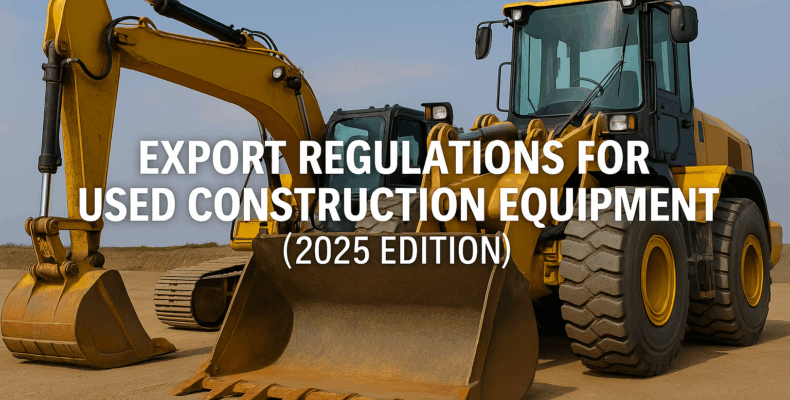The global demand for used construction equipment continues to surge in 2025. Japanese machinery — known for its durability, advanced engineering, and resale value — is now reaching more markets than ever. However, understanding export regulations is critical before making a purchase or placing an international order.
In this guide, we’ll explore everything international buyers need to know, from required documents to customs rules and inspections. Whether you’re buying a Komatsu excavator, a Caterpillar backhoe, or a Hitachi wheel loader, staying informed ensures smooth and legal shipments.
Why Buyers Prefer Japanese Construction Equipment
Japan’s strict manufacturing standards and maintenance culture make its used equipment highly sought after. Machines like excavators, bulldozers, and compact tractors often retain exceptional operational performance, even after years of use.
Additionally, many Japanese exporters maintain clean maintenance records and provide full documentation — which is essential for international compliance.
Key Export Regulations in 2025
As of 2025, the following are the major regulatory requirements for shipping used construction machinery out of Japan:
1. Inspection Requirements
-
Most importing countries demand pre-shipment inspections (PSI).
-
Organizations such as JEVIC or QISJ often conduct these inspections.
-
Inspections check for mechanical safety, environmental compliance, and accurate odometer readings.
2. Environmental Compliance
-
Countries like Kenya, Uganda, and Bangladesh require that equipment meet certain emission standards.
-
Machines with older diesel engines may be restricted unless retrofitted with emission filters.
3. Export Documentation
Required documents include:
-
Invoice
-
Export Certificate
-
Bill of Lading (B/L)
-
Packing List
-
Inspection Certificate (if applicable)
Customs agents in your country will verify all these. Missing paperwork can result in costly delays.
Import Restrictions by Region
Each country has specific rules:
-
Africa: Many African nations allow equipment that’s up to 10–15 years old, but must pass environmental and roadworthiness checks.
-
Southeast Asia: Some countries, such as the Philippines and Indonesia, prefer models with lower emissions and may ban heavy diesel engines.
-
Caribbean Nations: Countries like Trinidad & Tobago require a clean import history and full proof of previous ownership.
Always confirm with your local import office before finalizing any purchase.
Tips to Ensure a Smooth Export Process
-
Choose Reliable Exporters
Work with trusted Japanese companies that handle documentation and inspection. -
Verify Machine Age
Check the year of manufacture and compliance with destination country rules. -
Check for Free Trade Agreements
Some countries enjoy lower import duties due to trade deals with Japan. -
Secure Insurance
Cargo insurance protects against damage during shipping — highly recommended for high-value machinery.
Recommended Exporters for 2025
To avoid legal troubles and ensure smooth delivery, we strongly recommend sourcing from Japan’s most reliable exporters. Here are five highly trusted names in the market:
-
EVERY Co Ltd
-
SBT Co. Ltd.
-
Be Forward Co. Ltd.
-
Ramadbk Ltd.
-
Royal Trading Co. Ltd.
These companies specialize in exporting used trucks, buses, and construction machinery and have years of proven experience.
👉 Read the full details here:
Top 5 Trusted Japanese Used Truck Exporters for Global Buyers
Final Thoughts
The opportunity to import high-quality used construction equipment from Japan has never been better. However, as demand rises, regulations are becoming more detailed and country-specific. Therefore, understanding the 2025 export laws will not only protect your investment but also ensure that your machines arrive legally and on time.
By working with professional exporters and staying updated on policy changes, you’ll enjoy a seamless import experience — and gain powerful tools for your business or development project.
